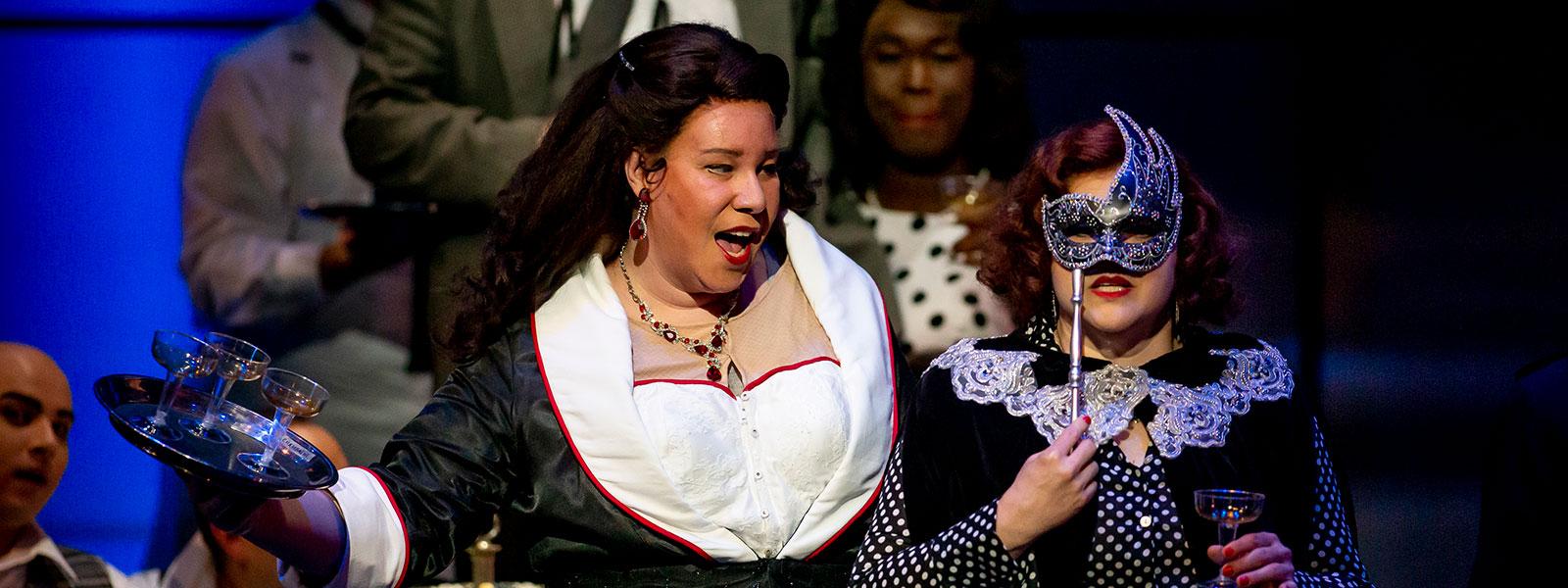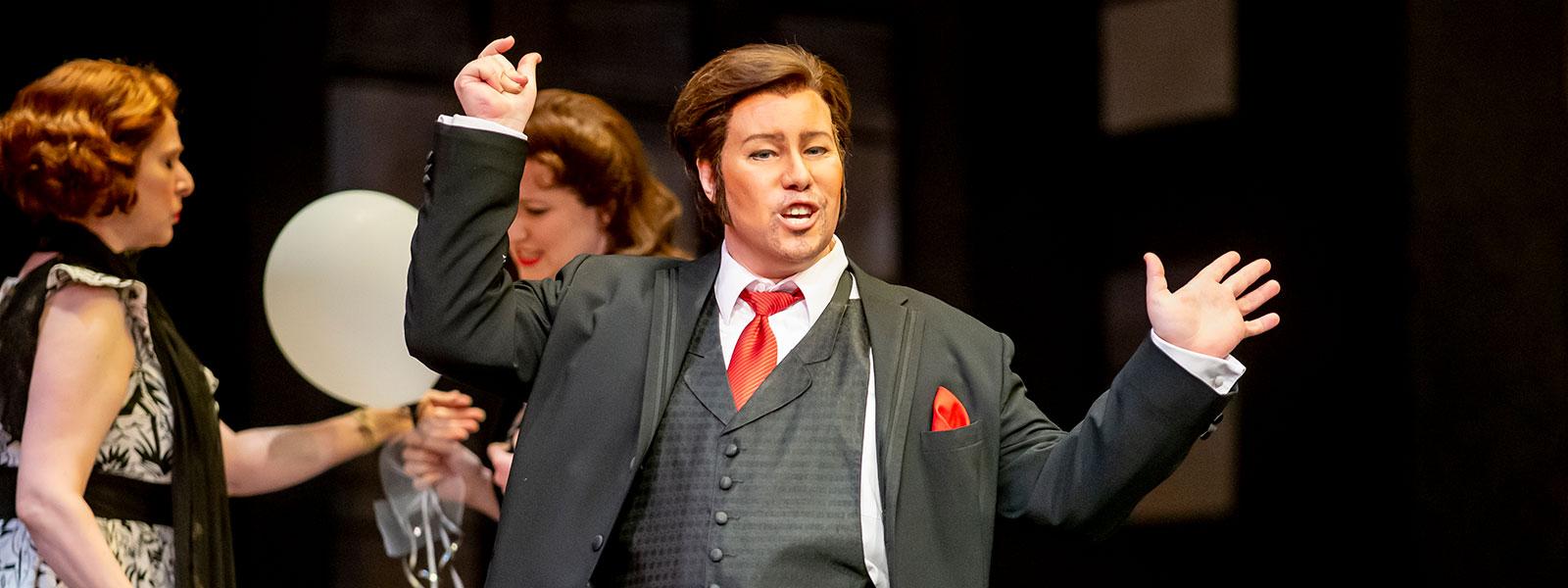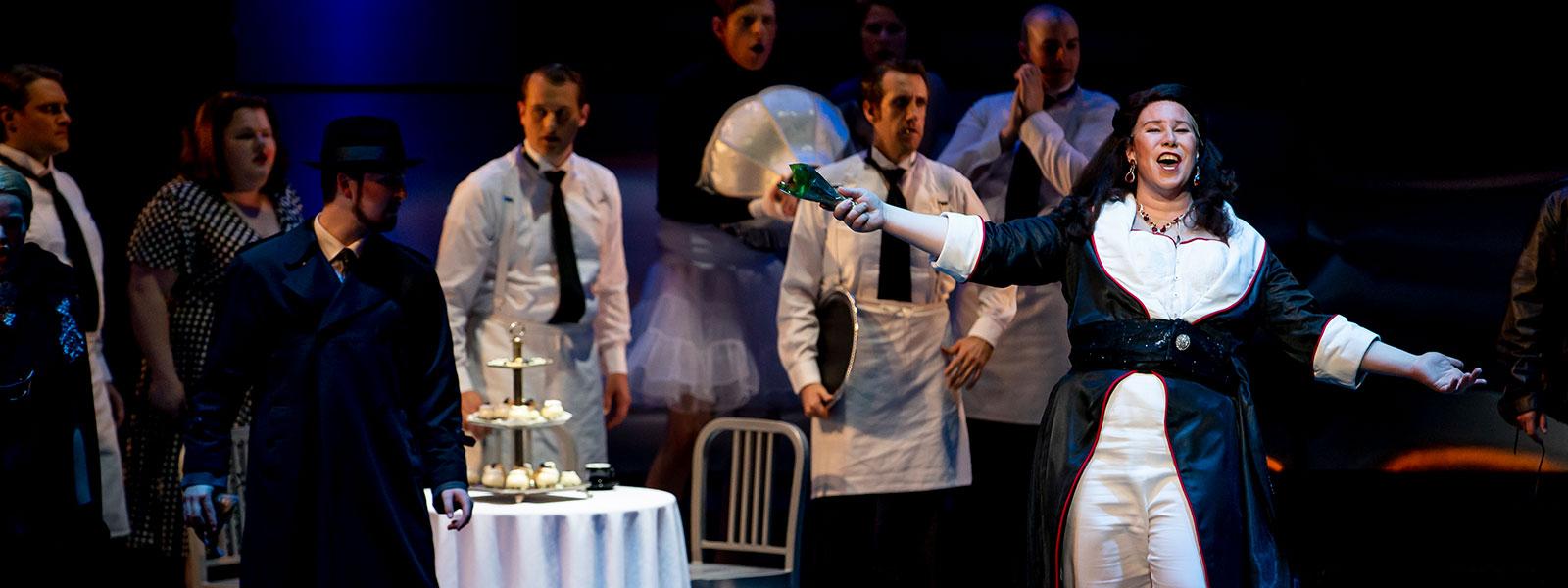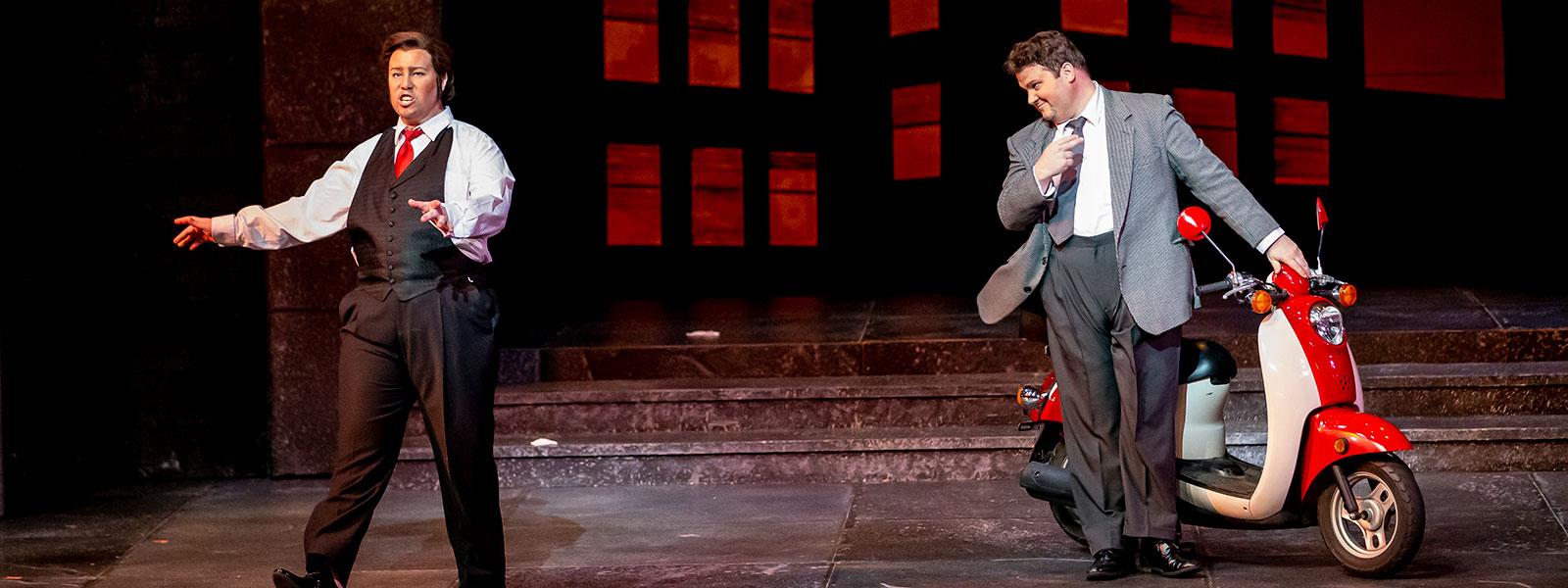Artist As Leader: Lucia Lucas
Lucia Lucas is an opera star on the rise, having sung on major stages all over the world, including Italy, England, Korea and Germany, where she currently resides. In 2019 she made her U.S. opera debut in “Don Giovanni” at Tulsa Opera. What made her well-reviewed performance historic is that Lucia sang the title role, becoming the first trans woman to play a leading part on an American operatic stage.
She continues to impress audiences with the same powerful and warm baritone she trained and developed when she presented as male. When Theater Magdeburg in Germany cast her as Wotan, the king of the gods in Wagner’s “Die Walküre” and one of the plummest and most challenging roles for any dramatic baritone, Lucia did not fail to impress. The newspaper Volkstimme praised her for her “powerfully clear singing” and “dramatically intense Wotan.”
In this interview with Pier Carlo Talenti, she explains how her focused commitment to her craft and career has kept her on a path of excellence that continues to open doors not only for her but hopefully also for the next generation of diverse and singular operatic talents.
Choose a question below to begin exploring the interview:
- Could you please start by telling us about how you led yourself on your artistic journey to where you are now?
- Along the way in your artistic journey, you also experienced a profound personal journey and transition. Can you talk about how your artistic practice and experience played a role in your transition?
- Do you consider yourself to be a leader?
- How do you handle any disrespect that you might face?
- Has your relationship to power and authority changed at all in recent years, especially in the world of opera?
- Do you find yourself still thinking about pushing the line as much as you do about your career?
- Epilogue
Pier Carlo: Could you please start by telling us about how you led yourself on your artistic journey to where you are now?
Lucia: Sure. I guess, for me, art has always been a way for me to release steam or to express myself. It’s always been that sort of thing, and so it was only natural that eventually, when I came out, I would decide that I’m going to continue doing my art’s journey. I started as an instrumentalist.
Pier Carlo: What was your instrument?
Lucia: I started as a French horn major in undergrad, and I did my French horn degree and my voice degree concurrently, both in performing. So I did two recitals of each. Then I went to Chicago for my graduate degree and just did voice after that because it was clear that voice was the right way to go. I love French horn. I love listening to horn. I love playing horn. But realistically you have to focus a little bit if you want to do a really good job on one particular thing. From 2005 when I went to Chicago, it was just about voice and primarily about opera. Everything was geared toward becoming a better operatic singer and performer.
Pier Carlo: Along the way in your artistic journey, you also experienced a profound personal journey and transition. Can you talk about how your artistic practice and experience played a role in your transition? What about being a classically trained singer made it easier or more difficult to come out?
Lucia: Well, the part that was more difficult was deciding to really come out, because at the time it seemed very likely that my career would be over. I wasn’t projecting that at all, but I definitely did believe that my career could be over, not because I would be immediately fired but because I would be slowly phased out of the career, at least. So that was a difficult moment.
I had a friend who said, 'What are you going to do now?' I said, 'Did I say I was going to quit?' I’m still doing this career.
But overcoming people’s thoughts — not even necessarily negative thoughts or people who drove me out of the career, because really there wasn’t a whole lot of that — but just people who didn’t think it would be even possible to be an out trans person in the operatic landscape … . I had a friend who said, “What are you going to do now?” I said, “Did I say I was going to quit?” I’m still doing this career. My friend has since pulled out of the career and is having a wonderful life. It was more based on my determination to keep the career going. It was very much at that point on me to make sure my career went forward.
Pier Carlo: So how did you go about tending to your career while you transitioned and after?
Lucia: Well, immediately when I came out, the next week I had four performances of four different operas. The key there was that they were all male-presenting roles, of course, and that’s still the majority of my work. But I just went there and did my job. Luckily all of those operas had already had their premieres, and all I had to do was go there and be good.
So I went there that whole next week, wearing something more comfortable for me and presenting femme and going into the makeup chair and them drawing a beard or gluing a beard on me and drawing age lines on me and all the different things that happen when you have to play 50-year-old men primarily onstage. Then after that, I would put my clothes back on and go home. I tried to make it as normal as possible, as normal as it had always been.
Pier Carlo: For you or your collaborators?
Lucia: My performance, my performance. I tried to show that everything that I was doing onstage was just as it always was. I didn’t have an agenda onstage; I wasn’t trying to show anything onstage; I was just trying to perform the operas as I had the week before. That was very important to me, and it is still very important to me that I live my life in a way that is calm.
I really try to show excellence in my craft as a way to show that my personal things that are going on have nothing to do with my professional work. I’m not trying to change my art form to suit me. I’m happy doing my art form as it is. I don’t have to make all of my characters female. There are directors who do that, and, you know, we can play with that. Especially in Germany there’s a tradition to really interpret operas more so than in the US, to really take risks, I guess, to set something on the Moon, to just go wild with it. Sometimes it ends up with a really interesting take on it.
I did the villains in “The Tales of Hoffmann,” and three of them were feminine-presenting and one was masculine-presenting. The thing about the devil is that we see in art sometimes the devil is masculine, sometimes the devil is feminine. Even if we look at masculine characters, sometimes they’re very elegant in their presentation. So I feel that my background in gender should only be helpful toward that.
I guess the whole thing is, advocacy through normalcy. I hate the word normal because it is othering, but advocacy through normalcy: the idea that the best representation is not to be a huge, exaggerated version of yourself but just to simply be a person and do a good job.
I’m always willing to lose myself in a character. So you can dress me up however you want and you can tell me that I should play it a certain way, and I will do that, because that is part of my job. I guess the whole thing is, advocacy through normalcy. I hate the word normal because it is othering, but advocacy through normalcy: the idea that the best representation is not to be a huge, exaggerated version of yourself but just to simply be a person and do a good job.
Pier Carlo: Do you consider yourself to be a leader?
Lucia: I guess, accidentally, maybe. [She laughs.] I hope that I am a good influence, and if that makes me a leader, then that’s fine. I don’t want to be a self-proclaimed leader. I just want to do a good job, and if that inspires other people to do good jobs, then that makes me happy.
Pier Carlo: Because someone else might have answered your friend differently, might have answered, “Well, yes, of course I’m going to give up my career, because how can I keep going?” But you stuck to your guns. What is it in your character or in your background that facilitated that for you?
Lucia: I am very stubborn, and if I want something, I go after it with all of my energy. I was born in California, and now I live in Germany and have been here for over 10 years doing opera because I decided that I wanted to sing opera full-time, professionally, and that was the way to do it. I look at my goal, I assess how to get there and then I make it happen.
Pier Carlo: How do you handle any disrespect that you might face?
Lucia: Well, I think that you always try to invest your equity in yourself, and so every single time I get to the next level on something, there’s an additional thing that I can use for the next level. When I go do my first Wotan, then when I go to somebody and they’re like, “Oh, what do you do?” “I’m an opera singer.” “What do you sing?” “Well, I sing dramatic stuff, Verdi and Wagner.” If they want to ask more — usually that’s enough, and usually with random strangers I don’t want to get into everything — but if they want to know more, I say, “Well, I sing Wotan.”
Then in that moment it’s like, “Oh, like, for real? You sing Wotan?” “Yeah!” Then it’s just such a shock. They’re like, “Oh, well, where have you sung?” “Oh, well, I’ve sung at Teatro Regio. I’ve sung at Deutsche Oper. I’ve sung at English National Opera.” And if that’s not enough, in the spring, hopefully, if our current pandemic goes down, hopefully then I’ll make my Met debut next spring.
At that point, it’s like, “Oh, well, I had no idea!” Even if the thought in their brain is, “I had no idea that there were trans artists,” the fact that I have these certain houses on my resume, no matter whether they’re from the US or from the UK or from Germany or from Italy, they recognize that, well, I must be real if I have been to these places.
I think I use my accomplishments of the past to justify my existence in the business while being trans. I don’t know if that makes sense.
Pier Carlo: Yeah, absolutely. I love the image of investing ... you said, “investing my equity in myself,” I think, to build yourself forward. I think it’s a beautiful image of self-leadership.
Lucia: I mean, in a way, there’s a lot of testing your power and seeing if you’ll be accepted at the next level. I think that that’s really difficult for anybody who is not a traditional identity that you see onstage. It’s not just for me or for trans singers. At least in, let’s say, Germany, the UK and the US, I don’t think that being gay is a barrier to entry for at least opera and probably all types of theater and musical theater. I don’t think that that is a barrier in most Western countries.
I think it’s important to increase diversity, and I applaud theaters not for making statements but for making systematic change and increasing opportunities for people who may not have previously had the chance to make a career in opera.
But being trans, having a lot of melanin, I think that that does make it harder for people. It doesn’t mean that people aren’t in opera. There are some amazing artists in opera that are not, I don’t know, I guess, the tradition of Western opera going back hundreds of years. But I think it’s important to increase diversity, and I applaud theaters not for making statements but for making systematic change and increasing opportunities for people who may not have previously had the chance to make a career in opera.
I’m very proud to have worked with English National Opera. I think they make policies and they stick to those policies so that they can change the future of what’s possible for performers on stage.
Pier Carlo: Right. You brought up power a few minutes back, and I’m curious about if you find yourself leading differently now than when you presented as male. Has your relationship to power and authority changed at all in recent years, especially in the world of opera, which at least in America, I think, is one of the most hierarchical institutions? I don’t know what it’s like in Germany.
Lucia: I’m going to give a more detailed answer than I usually do, so this is a little bit deeper than I usually go. Also I’ve never really been asked this question quite this way, so thank you. I think that the type of visibility that I have now is more than I had before. What I mean by that is, as strange as it seems, I think I sort of blended into the texture of an opera ensemble or the opera as a business. I don’t think I stuck out. Maybe people saw moments of femme from me, but also being gay in the operatic world is not ... I don’t see it as a negative. I mean, maybe there are certain countries that you might not get invited to, but being a gay man or being perceived as a gay man or possibly gay, I think, is not a negative and possibly even a positive.
Before I came out, I was definitely hit on by different men in the industry. I’ve had a wife the entire time that I’ve been in the industry, but the sort of flirtations that go on, the touchy-feely stuff, that happened. My identity was not a barrier for inclusion in that I had been performing in Germany for five years as a Fest ensemble member, so I very much had a career that was at least going. It wasn’t huge, it wasn’t small, but it just kept going. There was just sort of, not invisibility, but definitely just sort of fitting into the texture, and it wasn’t a thing.
And now of course, when I came out, there were no professional trans opera singers. So when my friend said, “What are you going to do now?” that was kind of going, “Well, I don’t know any trans opera singers, and I can imagine that it will be difficult or may not even work.”
There was no way for me to be a trans female baritone and be stealth. So it was kind of like, 'Well, if I’m going to do this, I may as well be public ... Maybe I can be at least a positive example and maybe push the line a little bit.'
I tried to be a good person before I came out. I tried to be nice. I tried to protect people when I could, but I definitely was not ever thrust into some sort of leadership role or leadership spotlight. There was no way for me to be a trans female baritone and be stealth. So it was kind of like, “Well, if I’m going to do this, I may as well be public. I may as well use the communication skills that I’ve learned over the last 15 years of performing. Maybe I can do some good.” Not “Maybe I’ll try and be a leader,” but “Maybe I can be at least a positive example and maybe push the line a little bit.”
I knew when I came out that I likely would have at least another year in the business, and I wanted to be a good example. If I never got hired after that, at least I would have done a little bit of that. Then maybe the next person can do a couple of years, and then the next person can do five years, and then the next person can do a career. I’m just trying to push that line just a little bit and see what happens.
In the meantime I’m thinking about, “OK, well, I’m coming out.” And then I came out. Then, “OK, well, there’s no going back in the closet. So what now? Well, I try and do this to the best of my ability.” And in the back of my mind think about what I will do if I don’t have a career, if I can’t maintain this, or if people simply will not let me stay in the career, thinking about that a little bit but not hard enough to distract me from my goal, which was staying in the business as long as possible.
Then once I hit the moment that I had a professional career being out longer than I wasn’t out, then that was a very important milestone for me.
Pier Carlo: You could finally breathe, I imagine.
Lucia: Yeah. At that point, it’s just sort of like, “OK, now this is the bonus round. Now let’s just see what happens after that!” It was only my own pressure that I was putting on myself, but it sort of relieved some of that pressure, like, “All right, cool, now I have earned my place in the career as Lucia Lucas.” It’s not some sort of weird asterisk by my career that I transitioned before I stopped singing. My name before is less relevant, is actually less relevant than my name now. When people ask me about my name before, it’s like, that’s not important. My career is way bigger now than it was before.
But don’t get it twisted. I did risk my career to come out, and I did go through struggles. I don’t talk about them so much, but I absolutely did, and I feel that now that I have overcome those and I have proven to the people who will actually listen ... . There are always going to be people who just can’t deal with your identity. But to the people who were simply curious or doubting, I think I’ve done enough to show my validity in this business. As myself.
Pier Carlo: Do you find yourself still thinking about pushing the line as much as you do about your career? Or now that you feel you’ve arrived at a full career and are recognized as a leading singer, is that thought about pushing the line a little less relevant?
Lucia: All of my money that I make that is extra money — that does not go toward rent and food — goes toward plane tickets, to auditions, to coaching, to over-coaching, to new equipment so that I can do my job better, to expanding the ways in which I can create art.
We just bought a new video camera in the last couple of months because we did a video project with phones. We said, “You know what? For our next video project, we want it to be better quality.” So we took some of our extra money —
Pier Carlo: Who’s we?
Lucia: My wife and I. We both sing. She is in a Fest ensemble, so she’s a salaried full-time singer. She sings contralto, so she sings, you know, Erda, Klytemnestra … . Her specialty is also German dramatic repertoire. So we did the Wanderer/Erda scene from “Siegfried.” It’s online; anybody can see it. It’s called “Coffee, Gin and Murder.” When the pandemic started, we decided that we were going to keep making art no matter what was going on.
All of our work just immediately got put on hold. Any trips that I was going to do to the States were just done. Any talks that I was going to give were canceled, both in Germany and in the US. There was one in the UK that also got canceled that maybe I was going to do. Everything just sort of shut down. We said, “Well, do we feel comfortable enough to make art right now? Well, yes, with each other.”
So what we did is we disinfected one of our portable recorders and we dropped it off at a pianist’s house. He recorded the part and then gave it back to us. We did this all with all the proper social-distancing rules. Then we recorded our part into the computer, and then after we had a good audio going, then we started filming. We did scene by scene.
Long story short, basically, I’m not stopping. All of my extra money, all of our extra money, goes back into our artform. We both could have gotten jobs. I’ve also done computers since I was eight years old. If I had gotten my computer science or computer engineering degree — I did qualify to go into the school at CSU Sacramento — I probably would have been working at Intel or Google or wherever in Silicon Valley right now. We’d be in California living beautiful lives with plenty of money.
The reason why we are here is because we are devoted to this career and to this art form. So in that way we are pushing it.
Right now, we are both in Germany in a 24-square-meter apartment, a 250-, 260-square-foot studio apartment, which is our home base. Until recently I was just here for a couple of weeks, and then I would fly out to London. Then I would fly out to the US and fly out to wherever. But the reason why we are here is because we are devoted to this career and to this art form. So in that way we are pushing it. We are still not going home and spending time with family and friends because we are that devoted to this career.
Epilogue
Lucia Lucas reminds us of the incredible power of leading from one’s truest sense of self. Lessons we can take from our time with Lucia include:
- Be courageous. It can be daunting to claim your authentic voice, but only by developing and celebrating that voice will you be able to interact with others authentically and effectively gain willing followership.
- Be professional. It’s great to take leaps of faith while also recognizing that the arts is a business. Be true to yourself and be indispensable to others.
- Be great. Innovations stick when they are brilliant and appreciated. Be yourself and be excellent at what you do. Commit to both equally.
- Set goals and actively pursue them. It’s hard to get anywhere if you rely on others to shape your career. Be intentional about where you are going and have a clear and specific plan to get there.
- Keep working. Pandemic or no, artist leaders continue to push the envelope. Put your work out in the world however you can. People need the arts now more than ever.











